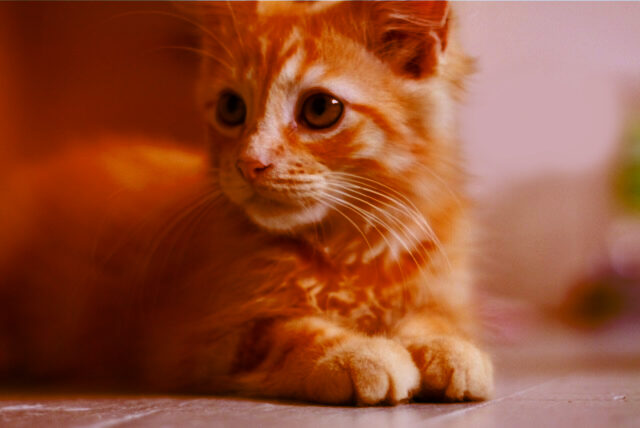
Feline immunodeficiency virus (FIV) is defined as a lentivirus that infects cats’ immune systems. It is one of the most common and serious diseases in felines, with around 2%-5% of cats infected in North America. Cats with FIV may appear normal without symptoms for a length of time and can live an average life, but eventually, they become immune deficient, unable to produce antibodies to fight off the virus and becoming more susceptible to normally harmless bacteria, protozoa, viruses, and fungi. FIV has a mortality rate of 20%, but most cats can survive if they are not also infected with the feline leukemia virus. The average life expectancy for an infected cat is five years.
FIV is similar to human immunodeficiency virus (HIV), the virus that causes AIDS in humans. However, unlike AIDS, FIV is not sexually transmitted; it is spread through a bite from an infected cat. Casual contacts, such as sharing food and water or mutual grooming, have not been shown to spread the virus. Cats living in the same household who do not fight generally have a lower risk of contracting the virus. A mother cat who becomes infected during pregnancy has a higher risk of transmitting the virus to her kittens.
There are three phases of FIV infection. The first phase occurs 1-3 months after infection, and the virus attacks the lymph nodes and reproduces in white blood cells. It then spreads through other lymph nodes in the body, which can lead to symptoms such as fever, depression, and appetite loss. The second phase is asymptomatic, which occurs when the virus begins to reproduce very slowly, and cats will not show any signs of illness. The third phase occurs when the virus begins to spread throughout the entire immune system, causing secondary infections and outward illness.
There may be infections in the upper respiratory tract, skin, eyes, or urinary tract. Inflammation of the gums (gingivitis) and dental disease can also occur. Infected cats that reach this phase are also highly likely to develop cancer, weight loss, seizures, and neurological disorders.
In North America, there was a vaccine for FIV, but it was discontinued for an unknown yet highly speculated reason. It is assumed that this vaccine was discontinued either because indoor cats had a lower risk of becoming infected, it only protected against a limited number of FIV infections, or it contributed to false-positive tests. This means that once a cat is tested positive, it is assumed the cat is infected with the virus, but the test is unable to distinguish between antibodies produced by the vaccine from natural infection, so the cat isn’t infected.
There are many ways to manage the spread of FIV. Spaying and neutering are highly recommended to reduce the spread from pregnant female cats to kittens, as well as to prevent male cats from roaming and fighting. They should also be fed a nutritional and balanced diet and uncooked food such as raw eggs and meat. Unpasteurized dairy products should be avoided to prevent foodborne infection. Wellness visits in healthy infected cats should be scheduled every six months.
Post written by: Estelle Ferrari, a local High School student who has a love of writing, creativity and cats.
Sources:
https://www.vet.cornell.edu/departments-centers-and-institutes/cornell-feline-healthcenter/
health-information/feline-health-topics/feline-immunodeficiency-virus-fiv
https://www.petmd.com/cat/care/what-fiv-and-why-fiv-vaccine-no-longer-available

